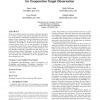Free Online Productivity Tools
i2Speak
i2Symbol
i2OCR
iTex2Img
iWeb2Print
iWeb2Shot
i2Type
iPdf2Split
iPdf2Merge
i2Bopomofo
i2Arabic
i2Style
i2Image
i2PDF
iLatex2Rtf
Sci2ools
ATAL
2005
Springer
2005
Springer
Tunably decentralized algorithms for cooperative target observation
Multi-agent problem domains may require distributed algorithms for a variety of reasons: local sensors, limitations of communication, and availability of distributed computational resources. In the absence of these constraints, centralized algorithms are often more efficient, simply because they are able to take advantage of more information. We introduce a variant of the cooperative target observation domain which is free of such constraints. We propose two algorithms, inspired by K-means clustering and hill-climbing respectively, which are scalable in degree of decentralization. Neither algorithm consistently outperforms the other across over all problem domain settings. Surprisingly, we find that hill-climbing is sensitive to degree of decentralization, while K-means is not. We also experiment with a combination of the two algorithms which draws strength from each. Categories and Subject Descriptors I.6 [Simulation and Modeling]: Model Development; G.3 [Probability and Statistics...
Related Content
| Added | 26 Jun 2010 |
| Updated | 26 Jun 2010 |
| Type | Conference |
| Year | 2005 |
| Where | ATAL |
| Authors | Sean Luke, Keith Sullivan, Liviu Panait, Gabriel Catalin Balan |
Comments (0)

